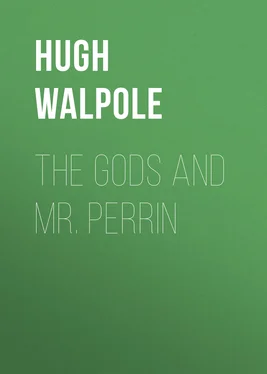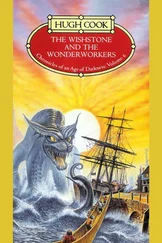Hugh Walpole - The Gods and Mr. Perrin
Здесь есть возможность читать онлайн «Hugh Walpole - The Gods and Mr. Perrin» — ознакомительный отрывок электронной книги совершенно бесплатно, а после прочтения отрывка купить полную версию. В некоторых случаях можно слушать аудио, скачать через торрент в формате fb2 и присутствует краткое содержание. Жанр: foreign_dramaturgy, foreign_antique, foreign_prose, на английском языке. Описание произведения, (предисловие) а так же отзывы посетителей доступны на портале библиотеки ЛибКат.
- Название:The Gods and Mr. Perrin
- Автор:
- Жанр:
- Год:неизвестен
- ISBN:нет данных
- Рейтинг книги:3 / 5. Голосов: 1
-
Избранное:Добавить в избранное
- Отзывы:
-
Ваша оценка:
- 60
- 1
- 2
- 3
- 4
- 5
The Gods and Mr. Perrin: краткое содержание, описание и аннотация
Предлагаем к чтению аннотацию, описание, краткое содержание или предисловие (зависит от того, что написал сам автор книги «The Gods and Mr. Perrin»). Если вы не нашли необходимую информацию о книге — напишите в комментариях, мы постараемся отыскать её.
The Gods and Mr. Perrin — читать онлайн ознакомительный отрывок
Ниже представлен текст книги, разбитый по страницам. Система сохранения места последней прочитанной страницы, позволяет с удобством читать онлайн бесплатно книгу «The Gods and Mr. Perrin», без необходимости каждый раз заново искать на чём Вы остановились. Поставьте закладку, и сможете в любой момент перейти на страницу, на которой закончили чтение.
Интервал:
Закладка:
He himself had not noticed the attachment until the holidays. She had stayed at Moffatt’s during part of the summer term, and he had played tennis with her and talked to her and even walked with her. But it was not until he had returned to the seclusion of his aged mother and Buckinghamshire that he realized that for the first time for twenty years he was in love.
The discovery affected him in many ways. In the first place it swept away in the most curious manner all the years that had intervened since the last affair. He was suddenly young again. He began to regret the way that he had spent his days. He played tennis (badly but with enthusiasm). He talked to the men of his Club about “the absurdity of considering forty-five any age,” and quoted juvenile athletes of eighty. He gave his mustache a terrible time, wearing things to hold it straight at night, looking at it often in the glass.
He told his aged mother (a very old lady with a brown, shriveled face, a white lace cap, and mittens) vaguely but magnificently about there being somebody. He hinted that she cared for him and was eager to marry him as soon as he felt ready to ask her. He talked about “getting a house,” even about wallpapers and stair-carpets and a nice sunny room for the old lady.
She was delighted at first, and then agitated. Who might this new young person be? Perhaps she would not like her—in any case, it meant taking a second place. But she idolized and worshiped her son: she knew sides of him that no one else knew—she saw him as a little, thin, serious hoy in knickerbockers.
But this new spirit revived things in Vincent Perrin that he had long thought dead. He knew, he savagely knew, in his heart of hearts, that he was a failure; he was determined that the world should never know it; he covered his knowledge with a multitude of disguises; but now perhaps, if she cared for him, there might yet be a chance.
But most of all he was afraid of something—he could never give it a name—that always crept slowly, increasingly over him as term advanced. He could not give it a name: that thing made up of a myriad details, of a myriad vexations; that evil spirit that they all, the masters and the rest, seemed to feel as the weeks gathered in numbers—the end-of-termy feelings: strained nerves, irritated tempers, almost, the last week or two when examinations came, seeing red.
No—this term it shall be all right. He felt, as he said good-by to his mother and kissed her, almost an eagerness to get back and prove that it was all right. After all, Searle had left, and there was Miss Desart. Supposing she cared for him? He twisted his thin fingers together. Oh! what things he could do!
And so he was glad of Mrs. Comber’s dinner-party.
Giving a dinner-party was no light, easy thing for Mrs. Comber. So many wide issues were involved. Not very many dinner-parties were given during the term, and Mrs. Comber was perfectly aware of all the conversation that it would give rise to, of all the people that would in all probability be angry with all the other people because they had been asked or because they had not. There was, generally, a reason for a dinner. Some important person had to be asked, some unimportant people had to be worked off, someone was conscious that there had not been a dinner-party for a very long time. But on this occasion there was no reason except that Mrs. Comber had liked the look of young Traill, had at once thought of Isabel, and had conceived a plan.
Then, of course, it followed that other people must be asked: Vincent Perrin, because she didn’t like him, but felt that she ought to; the Dormers, because it was time they were asked; and the elder Miss Madder, because she was the nicest of the matrons and wouldn’t talk quite so much and quite so spitefully as the others would.
All this involved danger and destruction as far as the people invited were concerned. One chance word at dinner—some errant, tiny omission or commission—and anything might happen: the time might be made miserable for everybody.
But there was more immediate peril in it than that. There was in the first place “ways and means.” How this harassed poor Mrs. Comber no words can say. She was forced to drive her frail cockle-shell of a boat between the Scylla of increased bills and the Charybdis of not-being-smart-enough.
Were things not right—if there were no meringues, no mushroom savories (there were rules and regulations about these things), no kummel—well, the party had better not be given at all. And then, on the other hand, there was the end of the month, nothing in hand to pay, and Freddie scowling over his Greek Athletes to such an extent that it wouldn’t do to speak to him. All this was dreadfully difficult, but it revolved in reality almost entirely around Freddie’s stout figure. Every dinner-party, every party of any kind, was an attempt to win Freddie back.
Mrs. Comber never confessed this even to herself, and she was, poor woman, only too completely aware that its usual result was to drive Freddie only more completely “in.” Something was sure to happen, before the evening was over, to annoy him—she would have “such a time afterwards.” But it always, of course, might be the other way. He might suddenly see, by some little word or act, how fond, how terribly fond, she was of him. She had learnt Bridge to please him—he used to like a game; but the result, although she would not admit it, had simply been disastrous.
She was much too muddled a person to be good at cards—she was very, very bad; she lost sixpences and shillings with the sinking feeling in her heart that they ought to be going to pay for their boys’ clothes. She plunged desperately to win it all back again—she was known throughout the neighborhood as the worst player in the world.
It was indeed this conclusion to the evening that she dreaded most of all. There were eight of them, so, of course, they would have to play. Her heart sank because of all the things that might happen.
But Isabel was, of course, the greatest use in the world. She saved all kinds of needless extravagances; she always got things where they were cheap and not bad, instead of getting them expensive and rotten. She thought of a thousand little things, and she managed the servants—only two of them, and both ill-tempered.
Mrs. Comber said nothing to Isabel about young Traill—she did not even think that she had as yet noticed him. They neither of them said a word about Mr. Perrin.
Gathered all together in the drawing-room, it was everybody’s chief object to avoid knocking things over. This may be taken metaphorically as well as literally, but in that ten minutes’ prelude everyone had the hard task of being socially agreeable to people whom they met, as they met their tables and their chairs, their beds and their hair-brushes, every day of their lives.
The curtains; had been closely drawn, but outside the winds were up and were beating with wild fingers at the panes. They gathered in clusters about the house, screamed in derision at the dinner-party, chattered wildly round the buttresses and chimneys of the sedate and solemn buildings, and then rushed furiously down the gravel paths and away to the sea.
The tall lamp had been so placed that its light fell on the peacock-blue screen and the ormolu clock; it also fell on the enormous shoulders, in black silk, of Miss Madder, on the thin, bony neck of Mrs. Dormer, and on the deep red of Mrs. Comber’s dress (open at one place at the back, where it should have been closed, and cut, Mrs. Dormer considered, a great deal lower than it need have been).
They were all waiting for Mr. Comber, and Mrs. Comber was trying to explain to Traill why Freddie was always late, why people at Moffatt’s always liked meringues, and why with a magnificent “heart” hand she had, only two nights ago, gone hearts with most disastrous results. “They like them best with jam in them—you shall see to-night if they aren’t good; and there was really no reason at all why they shouldn’t have come off, but we had such bad luck, and I oughtn’t to have played my King when I did; I’m always telling him that he ought to go and dress a little earlier—but he stays working.”
Читать дальшеИнтервал:
Закладка:
Похожие книги на «The Gods and Mr. Perrin»
Представляем Вашему вниманию похожие книги на «The Gods and Mr. Perrin» списком для выбора. Мы отобрали схожую по названию и смыслу литературу в надежде предоставить читателям больше вариантов отыскать новые, интересные, ещё непрочитанные произведения.
Обсуждение, отзывы о книге «The Gods and Mr. Perrin» и просто собственные мнения читателей. Оставьте ваши комментарии, напишите, что Вы думаете о произведении, его смысле или главных героях. Укажите что конкретно понравилось, а что нет, и почему Вы так считаете.











